ISLAMABAD: Pakistan’s Foreign Minister Shah Mahmood Qureshi said that India can resort to a “false flag operation” to divert attention from Jammu and Kashmir after its diplomatic defeat at a United Nations Security Council (UNSC) meeting on Friday.
“To divert international attention, most probably India can resort to some false flag operation. We want to timely inform the international community that we have doubts on Indian intentions. We know their plans and the nation is ready for it,” he said.
In a letter to the UNSC dated August 13, Qureshi had asked for an urgent meeting on Jammu and Kashmir after India unilaterally revoked its Article 370 which had accorded a special status to the Valley. Indian-administered Kashmir has remained under lockdown, with phone and Internet services suspended since the decision on August 5.
The UNSC took up the matter when it convened a meeting on Friday.
Addressing a joint press conference with the Director General Inter-Services Public Relations, Major General Asif Ghafoor – following the UNSC’s meeting on Kashmir – he said that Pakistan’s army and the nation were ready to defend any misadventures on part of India.
Qureshi, for his part, added that the committee had decided for a special cell to be set up for Kashmir at the Foreign Office which could devise the future course of action on the matter.
Additionally, the members also agreed on the need to increase lobbying at the international level. For the purpose, specific Kashmir desks will be established at various Pakistani embassies across the world “in order to carry out effective communication on the matter.”
The purpose of the meeting was to send out a message that Pakistan was on the same page on all matters pertaining to Kashmir and India’s actions there.
“The committee on Kashmir has members from all concerned parties, including members of opposition parties,” he said.
Qureshi lauded the “historic” UNSC meeting held on Friday which saw the council members urge all parties involved to refrain from any unilateral action which could further aggravate the situation.
“We achieved a milestone yesterday, which shocked India. The Kashmir issue was raised at a platform which is responsible for resolving the dispute,” he said, adding that the committee agreed that India’s strategy revolved around the “Doval doctrine.”
“Indian PM Narendra Modi, Home Minister Amit Shah and National Security Adviser Ajit Kumar Doval are the three main characters of this strategy. Modi has murdered Nehru’s Hindustan. Today, it is not Nehru’s Hindustan. It is Modi’s Hindustan,” Qureshi said.
Commending the indomitable and unbroken spirit of residents in Indian-administered Kashmir, Qureshi noted that despite the curfew, Kashmiris came out of their houses on Friday to offer special prayers. “It was a glimpse into their emotions, into what it would be like after the curfew lifts,” he said.
He said the world bodies have responded positively to Pakistan’s call to discuss the issue at hand. “The OIC and UNSC have both responded positively to Pakistan’s call for the Kashmir issue to be taken up. The OIC has called for an immediate end to the curfew in occupied Kashmir,” he said.
Throwing light on India’s move to do away with Article 370 of the constitution, Qureshi said: “Pakistan does not recognize Article 370 of the Indian constitution, it is not our concern. Our concern is with the forceful change in Kashmir’s demographic and violation of the rights of the people of Kashmir.”
Meanwhile, Pakistan army’s spokesman Maj Gen Ghafoor reiterated that the military, with the help of the entire nation, were ready to respond to any act of aggression by India. “Pakistan army is fully prepared to confront every misadventure by India. India’s provocation continues across the Line of Control [LoC].”
Responding to a question on Indian Defense Minister Rajnath Singh’s statement, he said that the world needs to take note of the irresponsible comments made by him.
“Pakistan is a responsible state, but India has always threatened us. Responsible states do not make statements like Rajnath Singh,” he said, adding that Pakistan was sending more forces to the LoC. “We are planning how to manage the threats from India,” he said.
He added that Indian soldiers have been deployed at every nook and corner of the Valley, even as the world keenly observes human rights abuses by the troops.
“At the present stage, the biggest issue in Jammu and Kashmir is about human rights’ violations. The entire region has been turned into a prison,” Maj Gen Ghafoor said, urging the international community to make more efforts for the resolution of the dispute which he termed as “a nuclear flashpoint” between Pakistan and India.
Talking to the media separately, he made it clear that Pakistan would not take any action which may lead to the international opinion changing against Islamabad.
“With the number of Indian troops present in the Kashmir region at the moment, even if a single person enters there [without them knowing] it would be a huge failure on India’s part,” he said.
Former Pakistani Ambassador to India, Abdul Basit seconded the Foreign Minister’s false flag operation claim by saying that there is a possibility of a staged terrorist attack by India to divert attention from Jammu and Kashmir, especially with an increase in international pressure.
“It is possible that India can stage a Pulwama or Pathankot-type attack. I think it can be outside Jammu and Kashmir especially in Indian Punjab side to damage Kartarpur corridor as well,” he told Arab News.
He said any direct attack on Pakistan by India would be a huge mistake. “They (India) might have worked out their strategies but when the situation in IOK is so much tense and deteriorating, it would not be wise to open another front. The actual situation will be cleared after lifting of curfew but I don’t see direct conflict anytime soon.”
Commenting on Pakistan’s future course of action, he said that Pakistan should arrange for an OIC foreign ministers’ summit in Islamabad as quickly as possible. “Along with arranging the summit, Pakistan should also hold a big convention of Kashmiri diaspora in London or somewhere which can come up with some resolution. Pakistan should also deploy a special envoy on Kashmir,” Basit said.
India can conduct “false” operations after defeat at UN, Pakistan’s FM says
India can conduct “false” operations after defeat at UN, Pakistan’s FM says
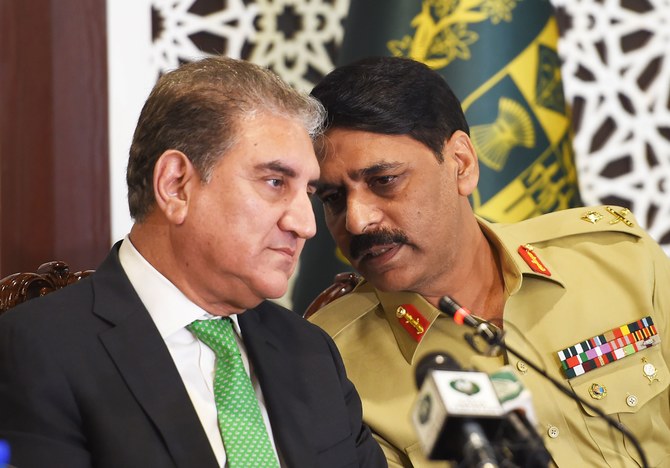
- Qureshi says Islamabad will intensify lobbying to highlight situation in Jammu and Kashmir.
- Pakistan will send more troops to LoC to manage threats from India, army spokesperson says
Pakistan’s planning minister discusses enhanced educational ties with UK delegation
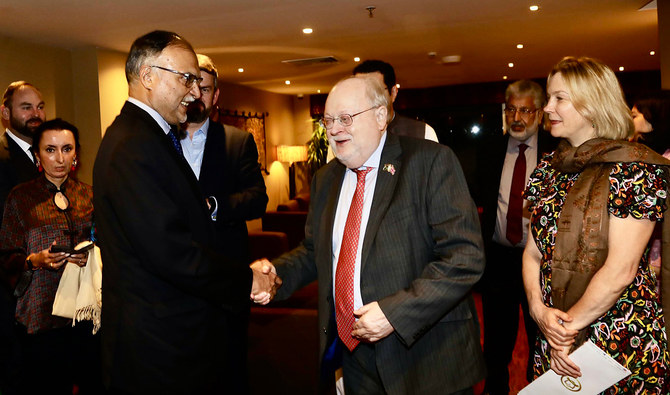
- Ahsan Iqbal proposes faculty training, research collaboration and UK campus expansions in Pakistan
- He says UK universities should develop specialized knowledge clusters through Pakistani scholars’ expertise
ISLAMABAD: Pakistan’s planning minister Ahsan Iqbal met a delegation from the United Kingdom, said an official statement on Thursday, to discuss the possibility of fostering closer ties and enhancing collaboration between the educational institutions in both countries.
British universities are a popular destination for Pakistani students due to the quality of education and the strong historical and cultural ties between the two countries.
Many students from Pakistan go to these educational institutions on scholarships offered by various organizations, such as the British Council, UK government and universities themselves, while others fund their studies independently.
The Pakistani planning minister presented various recommendations during his meeting with the delegation led by Steve Smith, the UK government’s International Education Champion, along with officials of the British High Commission.
He proposed faculty training programs to bolster academic expertise across borders, encouraging UK universities to establish campuses in Pakistan to promote educational accessibility and harnessing the expertise of Pakistani scholars in British universities to develop specialized knowledge clusters on the country.
“Pakistan envisions a future where universities in Pakistan are categorized into the Champions League (having first-tier universities) and the National League (having second-tier universities), driving excellence and accessibility in higher education,” Iqbal said during the meeting.
He highlighted the imperative for joint research initiatives, pointing at the importance of establishing joint research groups and fostering collaborations between PhD scholars from both countries.
The visiting delegation official reaffirmed the British government’s commitment to building international partnerships in education, citing the presence of over 20,000 Pakistani students in his country and 8,000 students who are pursuing degree programs in Pakistan with UK’s financial support.
The two sides also discussed procedural issues while pointing to the need for streamlined regulations, with a particular emphasis on minimizing hurdles for universities and strengthening the link between research institutions and economic growth.
They agreed to hold further dialogue and take concrete action toward implementing the planning minister’s recommendations to further solidify the foundation for enduring academic cooperation between the two countries.
US ambassador optimistic about Pakistan-IMF talks ahead of key funding meeting on April 29
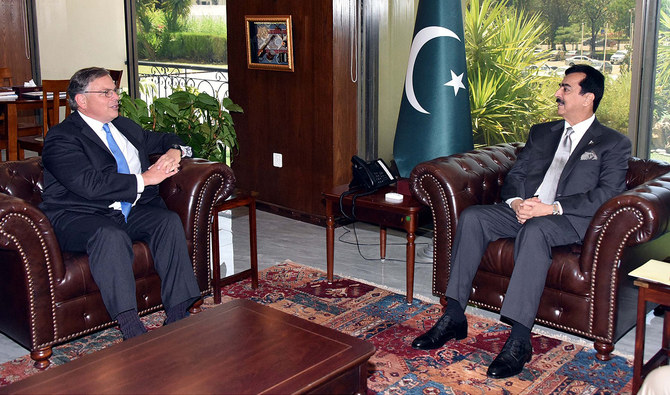
- The IMF has confirmed its executive board’s meeting to discuss the approval of $1.1 billion for Pakistan next week
- Ambassador Blome says the IMF’s positive feedback will further encourage investors and help Pakistan’s ailing economy
ISLAMABAD: US Ambassador Donald Blome expressed optimism over the ongoing negotiations between Pakistan and the International Monetary Fund (IMF) on Wednesday, as the global lending agency confirmed its executive board meeting for April 29 to discuss the approval of $1.1 billion funding for the South Asian state.
The funding is the second and last tranche of a $3 billion standby arrangement with the IMF, which it secured last summer to avert a sovereign default and which runs out this month. Pakistan is now seeking a new long-term and larger IMF loan, with finance minister Muhammad Aurangzeb saying Islamabad could secure a staff-level agreement on the fresh program by early July.
Ambassador Blome praised the performance of the country’s economic team in a meeting with the newly elected Senate chairman, Yousaf Raza Gillani, at the Parliament House wherein he also discussed strengthening of US-Pakistan bilateral relations.
“Acknowledging the positive economic indicators of Pakistan, Ambassador Blome noted the downward trend in inflation and high dollar reserves, stating that the IMF’s positive feedback would encourage investors,” said an official statement issued after the meeting. “He highlighted the flourishing gaming industry in Pakistan and called for enhanced [US-Pakistan] cooperation in the digital sector.”
The American envoy also noted the potential for further economic cooperation between the two countries in his conversation.
Pakistan’s $350 billion economy faces a chronic balance of payment crisis, with nearly $24 billion to repay in debt and interest over the next fiscal year — three-time more than its central bank’s foreign currency reserves.
Pakistan’s finance ministry expects the economy to grow by 2.6 percent in the current fiscal year ending June, while average inflation is projected to stand at 24 percent, down from 29.2 percent in fiscal year 2023/2024. Inflation soared to a record high of 38 percent last May.
With input from Reuters
In Rawalpindi, 77-year-old tea shop named after India’s Ludhiana is still a hit with customers
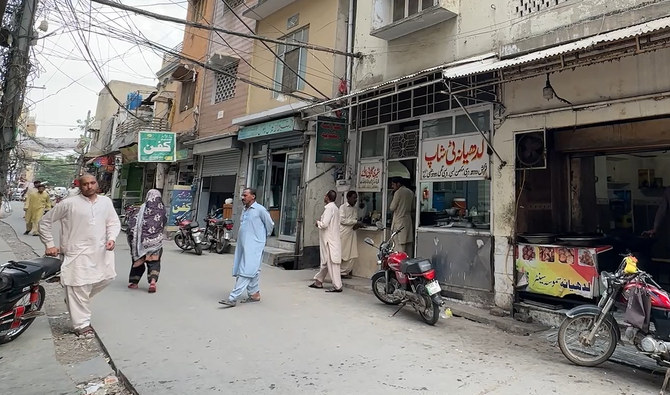
- Ludhiana Tea Shop owners migrated from India’s northwestern city at the time of Partition in 1947
- Customers say they come from far-off places to relish the taste of tea at the shop which they find unique
RAWALPINDI: At a small tea shop in Pakistan’s garrison city of Rawalpindi, Nazir Hussain pours piping hot tea from a kettle into small cups and hands them away to eager customers, many of them regulars who have been frequenting the shop for decades.
This is the scene from a typical evening at Ludhiana Tea Shop, located in the narrow streets of Rawalpindi’s old Lal Kurti area. The tea shop takes its name after the northwestern Indian city of Ludhiana, from where its owners migrated to Rawalpindi in 1947.
“My grandfather named this business in the memory of his hometown in India,” Hussain, who took charge of the shop in 1976, told Arab News, adding that he also sold dairy products and ghee.
“We are a family of milk sellers,” he said. “In India, we used to do the same. We were milk sellers and we used to own buffaloes.”
The shop has been serving tea to customers for the past 77 years. Agha Asghar Saeed, 72, is one of them and has been coming here since he was young.
“I was born here. I spent my childhood here, my youth and now my old age as well,” he told Arab News. “I’ve been having this tea since then.”
During the Muslim holy month of Ramadan, Saeed would break his fast at home but have tea at Ludhiana Tea Shop.
“I am addicted to this tea,” he explained.
But what inspires such loyalty in customers?
“You have to buy good quality milk,” Hussain said, adding that he purchased pure and organic milk for his shop that was a bit expensive. “Not everyone knows how to buy good milk.”
He maintained that most milk sellers in Pakistan did not sell pure milk, making him take several sips while buying to check the fat content.
Just like the milk, he continued, the quality of the tea leaves was also important.
The price of one cup of tea used to be around five paisas several years ago.
“Now, we sell it for Rs60 (22 cents),” he added.
The rich taste of Ludhiana Tea Shop means Muhammad Hasnain and his friends visit it every day rather than go to other tea shops in the neighborhood.
“Obviously, everybody wants a good bang for their buck,” Hasnain told Arab News. “The most important thing for anyone is that the quality should be good, and both quality and quantity are good here.”
Ludhiana Tea Shop offers customers deep-fried sweet and savory snacks, such as pakoras, samosas, jalebis and spring rolls, delectable items popularly consumed in Pakistan with tea.
Muhammad Shoaib Khan, a man in his 30s, informed he visited the shop with his friends at least a couple of times every day.
“We come on our bikes and travel for at least 1.5 kilometer on every trip,” Khan told Arab News. “It roughly adds up to 6 kilometers.”
Despite the cost of petrol, which has surged in recent times, Khan said he visited the shop for tea because it was worth it.
Hussain said he understood why customers came from far-off places just to have a cup of tea at his 77-year-old shop.
“Everyone cannot make good tea,” he said. “They don’t pour their heart in it. They lack passion. Making good tea is something that can only be done from the heart.”
Malala Yousafzai vows support for Gaza after backlash over Broadway musical
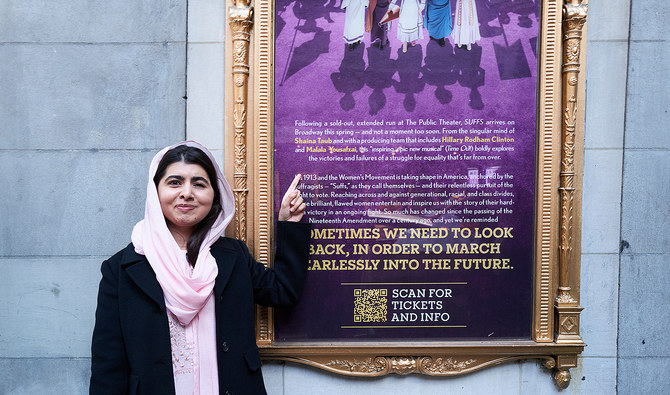
- Yousafzai was criticized in Pakistan for co-producing a play with Hillary Clinton who supports Israel’s Gaza campaign
- The Nobel laureate says ‘we do not need to see more dead bodies’ to understand the urgency of a ceasefire in Gaza
LAHORE: Nobel laureate Malala Yousafzai on Thursday condemned Israel and reaffirmed her support for Palestinians in Gaza, after a backlash in her native Pakistan over a Broadway musical she co-produced with former US Secretary of State Hillary Clinton.
Yousafzai, who was awarded the Nobel Peace Prize in 2014, has been condemned by some for partnering with Clinton, an outspoken supporter of Israel’s war against Hamas.
The musical, titled “Suffs,” depicts the American women’s suffrage campaign for the right to vote in the 20th century and has been playing in New York since last week.
“I want there to be no confusion about my support for the people of Gaza,” Yousafzai wrote on X, the former Twitter. “We do not need to see more dead bodies, bombed schools and starving children to understand that a ceasefire is urgent and necessary.”
She added: “I have and will continue to condemn the Israeli government for its violations of international law and war crimes.”
Pakistan has seen many fiercely emotional pro-Palestinian protests since the war in Gaza began last October.
Yousafzai’s “theatre collaboration with Hillary Clinton – who stands for America’s unequivocal support for genocide of Palestinians – is a huge blow to her credibility as a human rights activist,” popular Pakistani columnist Mehr Tarar wrote on social media platform X on Wednesday.
“I consider it utterly tragic.”
Whilst Clinton has backed a military campaign to remove Hamas and rejected demands for a ceasefire, she has also explicitly called for protections for Palestinian civilians.
Yousafzai has publicly condemned the civilian casualties and called for a ceasefire in Gaza.
The New York Times reported the 26-year-old wore a red-and-black pin to the “Suffs” premier last Thursday, signifying her support for a ceasefire.
But author and academic Nida Kirmani said on X that Yousafzai’s decision to partner with Clinton was “maddening and heartbreaking at the same time. What an utter disappointment.”
The war began with an unprecedented Hamas attack on Israel on October 7 that resulted in the deaths of around 1,170 people, according to an AFP tally of Israeli official figures. Hamas militants also abducted 250 people and Israel estimates 129 of them remain in Gaza, including 34 who the military says are dead.
Clinton served as America’s top diplomat during former president Barack Obama’s administration, which oversaw a campaign of drone strikes targeting Taliban militants in Pakistan and Afghanistan’s borderlands.
Yousafzai earned her Nobel Peace Prize after being shot in the head by the Pakistani Taliban as she pushed for girls’ education as a teenager in 2012.
However, the drone war killed and maimed scores of civilians in Yousafzai’s home region, spurring more online criticism of the youngest Nobel Laureate, who earned the prize at 17.
Yousafzai is often viewed with suspicion in Pakistan, where critics accuse her of pushing a Western feminist and liberal political agenda on the conservative country.
Pakistan commends UAE leadership for ‘swift’ response to record-breaking rains
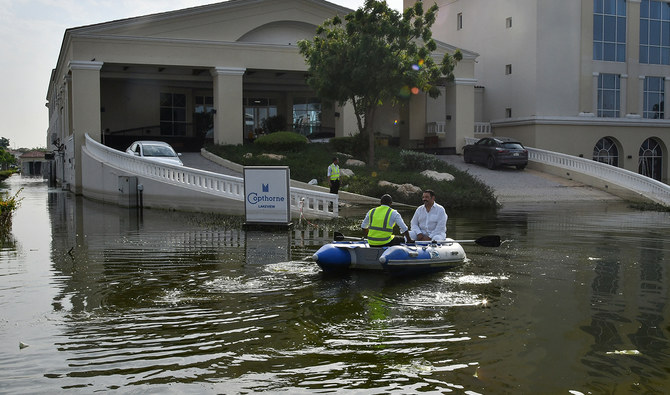
- Pakistan’s foreign minister telephones UAE counterpart, expresses sympathy over devastation caused by torrential rains
- Heavy rains lashed UAE last week, turning streets into rivers and hobbling Dubai airport, world’s busiest for global passengers
ISLAMABAD: Pakistan’s Foreign Minister Ishaq Dar on Wednesday commended the United Arab Emirates (UAE) leadership for its swift and efficient response to the devastation caused by record-breaking rains in the desert country.
Heavy rains lashed the desert country last week, turning streets into rivers and hobbling Dubai airport, the world’s busiest for international passengers.
The rainfall was the UAE’s heaviest since records began 75 years ago, dumping two years’ worth of rain on the desert country.
“Foreign Minister Ishaq Dar held telephone conversation with Foreign Minister His Highness Sheikh Abdullah Bin Zayed of United Arab Emirates to express deepest sympathy on the devastation caused by recent torrential rains,” Pakistan’s Ministry of Foreign Affairs (MoFA) said.
“He commended the leadership of the UAE for the swift, efficient and timely administrative response to this natural calamity,” it added.
The foreign ministry said both representatives also exchanged views on matters of bilateral and global importance.
Pakistan’s PM Sharif last Friday telephoned UAE President Sheikh Mohamed bin Zayed Al-Nahyan, urging both countries to collaborate to tackle the impacts of climate change.
Sharif had lauded the UAE president for his “outstanding leadership qualities” and strong commitment to ensure the welfare of the Emirati people.
Pakistan has been prone to natural disasters and consistently ranks among one of the most adversely affected countries due to the effects of climate change. Torrential rains have killed more than 90 people in the South Asian country this month, according to authorities.











